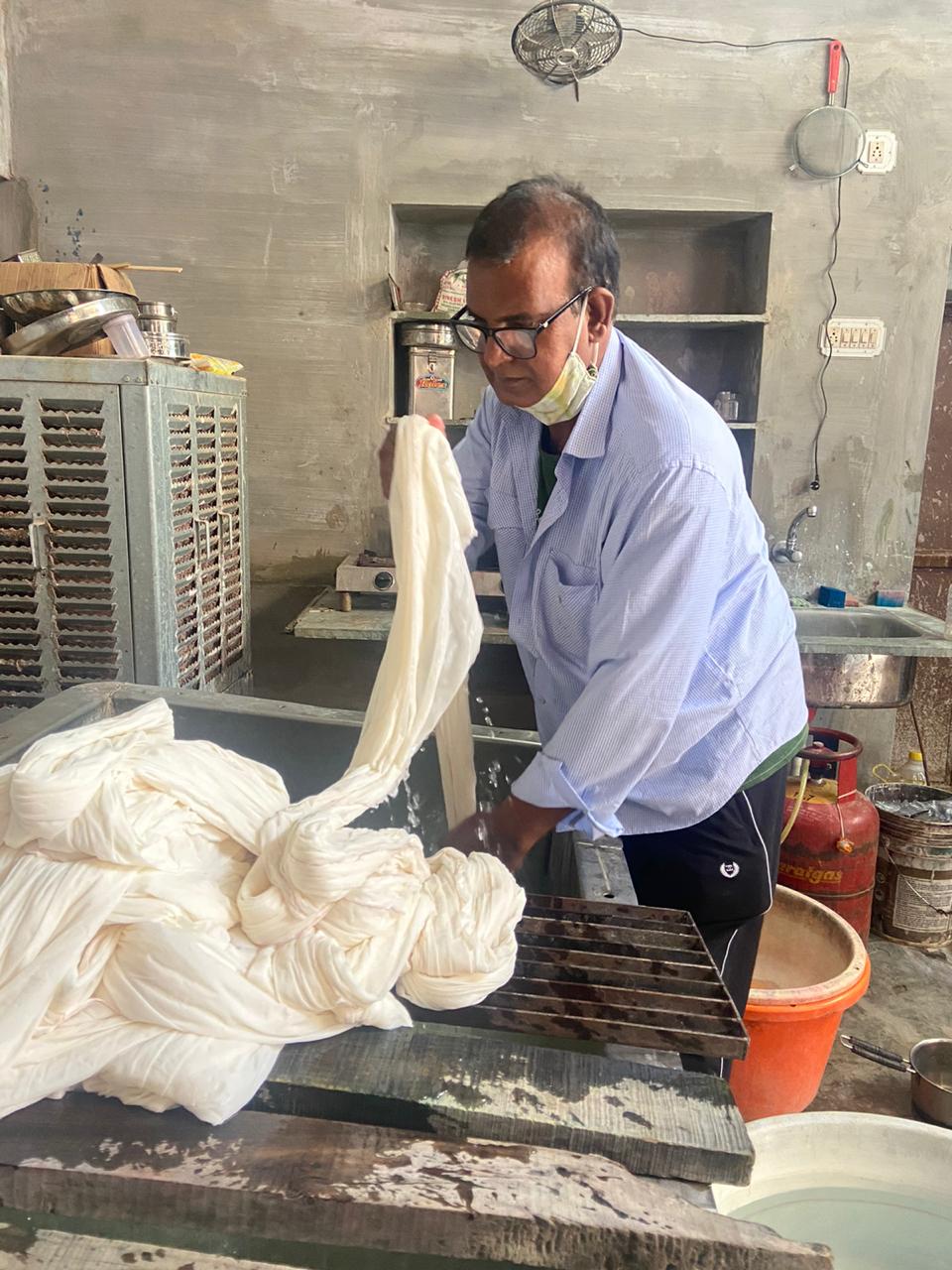The Meghwal community of Rajasthan are known for their art and crafts and are hugely dependent on the Muslim Rangrez community of the region, who are experts in the craft of tie-dye. Most of the elderly members from these communities believe that the relationship between the two communities used to be quite profound up until the 1971 Indo-Pakistan war. It was only after boundaries were constructed between the two countries – many Rangrezis went to Pakistan, some of the Meghwal families migrated to India – that the craft started to wither a bit, year by year.

Hasan Ali. Photo: Asif Saify.
The gap started converging later with the tourism boom in the city centres of the border districts like Bikaner, Jaisalmer, and Jodhpur. Rajasthani embroidery and woven products got attention both in domestic and international markets, thereby re-uniting the two communities.
The COVID-19 pandemic, however, has once again shaken the foundations of the ecosystem.
“I had to say no to my fellow artisans during this lockdown,” says 52-year-old Hasan Ali Rangrez, a Bandhej artist from Bajju Tejapura village in Bikaner district. “There’s no demand for our services, the dependency of both communities’ work has gone for a toss after the pandemic. My father says it’s similar to what he had witnessed during the 1971 crisis.”
Ali learned the art from his father and grandfather and this generational occupation has won him fame in his village and in the nearby district headquarter of Bikaner.

Hasan Ali’s colour making process. Photo: Asif Saify.
“I had a small setup of a dying unit in my house, but the sudden lockdown in the state barred people from moving. With transportation impacted, all of our orders got cancelled and I had to ask all the weavers to return. It’s been six months since then, I have not received any orders from dealers,” he said.
Shibori artisans, who mostly belong to the Meghwal community, are heavily dependent on Rangrezis for tie-dye. Several villages in Jodhpur district have adept Shibori artisans, who pursue their craft and forward the embroidered fabric to tie-dye artists like Hassan Ali. The COVID-19 pandemic and the subsequent lockdowns, however, disrupted the entire value chain and movement of their products.
Shyamlal, 42, from Ghantiali village of Jodhpur district, was one of the first craftsmen to start the Shibori craft in his village.
Also read: In Photos | A Kutch Magician’s Disappearing Act During Lockdown
“We could not move to the cities to get our payments for the work we already did. With the summer months approaching, we wanted work. During the summer, we only rely on crafts as agriculture in the desert has to wait till the onset of rains,” Shyamlal says. “We also couldn’t depend on animal trading due the transportation problem.”

Shyamlal. Photo: Rituja.
Just like the Rangrezis and Shibori craftsmen, the women artisans from the Meghwal community, who are pioneers of Kashidakari (embroidery), have been struggling through this pandemic. Most of these artisans, who have been dwelling far away from the villages in Dhaanis (agricultural land), were exclusively dependent on embroidery work coming from NGOs and middlemen from cities. With the lockdown, the transportation to these Dhannis from the villages was barred from two each day (in normal times) to none.

Women artisans at Beethnok village. Photo: Rituja
Almost no work for four months in the lockdown has created dissonance amongst these women, who were left without any communication. Soon after the first wave of lockdown got lifted, nonprofits like Urmul Trust approached these artisans to come on board to make masks and to create bags for the distribution of ration kits.

Tari Bai. Photo: Rituja.
Taari Bai – a 60-year-old Kashidakari artisan from Deri Talai village in Bikaner district – adds, “We never heard of masks, how could we make it? We were trained for a week and then we were asked to do Kashida in these masks”. For these women, it was a complete disruption of what they were previously doing.
For artisans like Taari Bai and many from her village, it was difficult to sustain and think of other livelihood options, so they pursued mask making.
“We were not ready for this, we had always embroidered in kurtas or thans (fabrics), but when all channels closed, we had to make masks and potlis” adds another woman artisan.
Taari Bai further says, “Coronavirus did not come to our village, but the effect of it came just like the way it it did with the 1971 war.”
Rituja Mitra completed her second Masters in development studies from Azim Premji University in 2020. She has been associated with Desert Resource Centre doing research on different aspects of the desert. The organisation currently hosting her is Urmul Trust which extensively works on artisans in the border villages.

